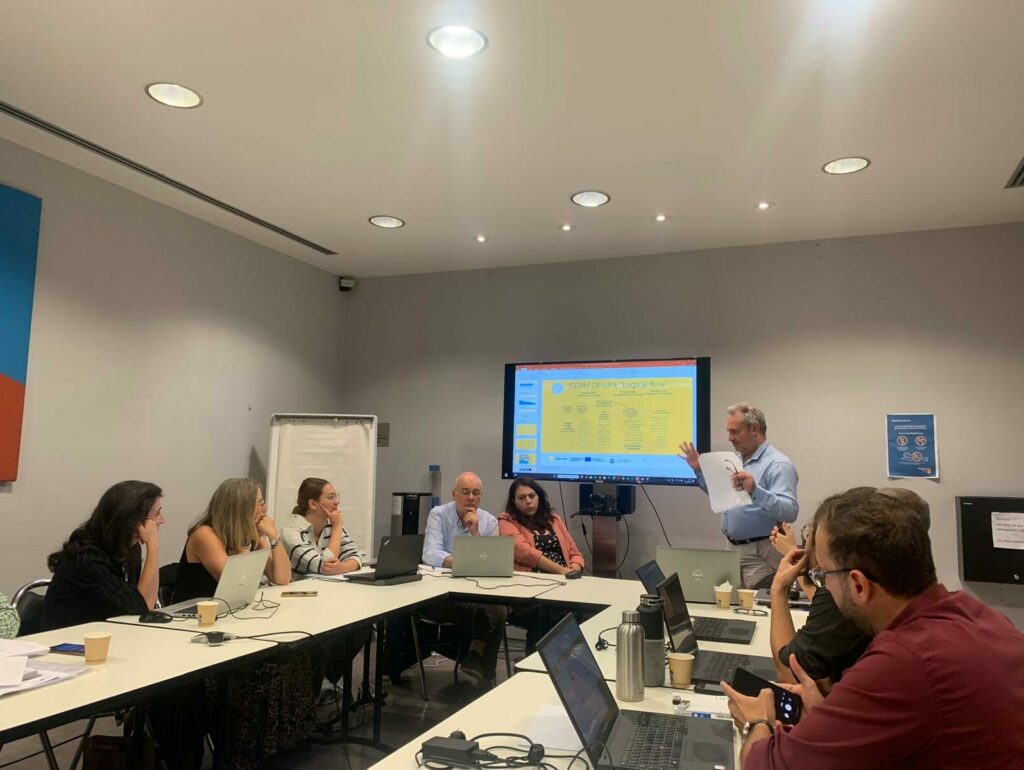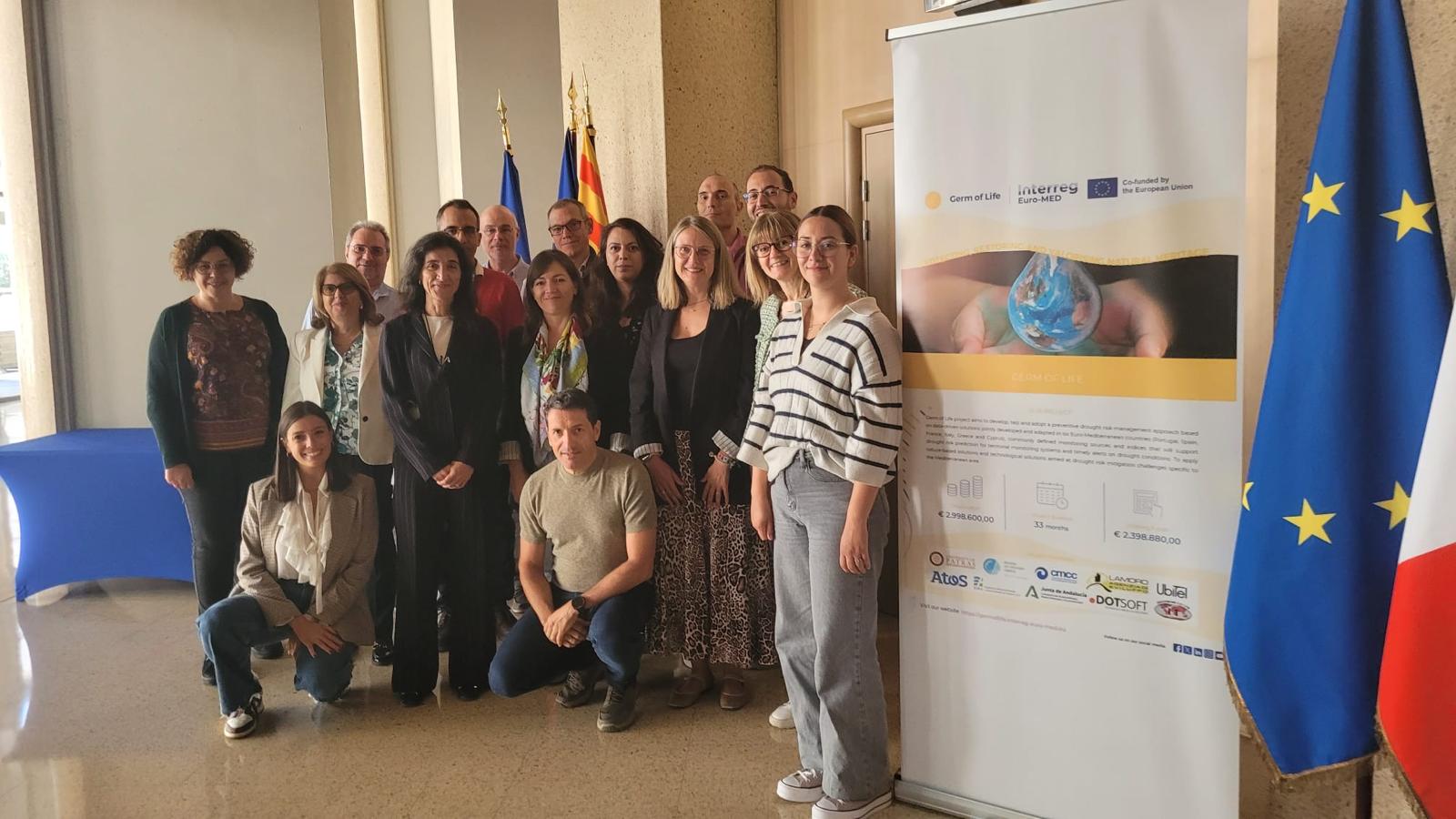The 10 entities from 6 countries that promote the Germ of Life project consortium have held their second face-to-face meeting in Marseille (France) to share progress in the structuring of its various technical and operational aspects. The French technology multinational Atos is one of the 10 partners and has acted as host. The Region Sud Provence-Alpes-Côte d’Azur collaborated in holding the meeting.
The main objective of the Germ of Life project, co-financed by the Interreg Euro-MED Programme, is to create an innovative digital technology system fot better preventive management of drought risks.
The project includes pilot tests to implement nature-based and technological solutions aimed at addressing drought risk mitigation challenges in the Mediterranean. The cross-border nature of the project enables stakeholders to collaborate on vulnerability assessments using a shared taxonomy and comparable data-driven risk assessments.
Germ of Life is led from the University of Patras (Greece) by Athanassios A. Argiriou, professor at its Atmospheric Physics Laboratory. The other partners are Region of Western Greece, Foundation Euro-Mediterranean Center on Climate Change (Italy), Lamoro Development Agency (Italy), Ubitel (Spain), Atos (France), The Development and Infrastructure Company of Alqueva (Portugal), Junta de Andalucía (Spain), Dotfsoft (Greece) and Infotrend (Cyprus).

Advances in Work Packages
The meeting took place in Marseille at the Hôtel de Région – Conseil Régional de Provence-Alpes-Côte d’Azur. The University of Patras, with Panagiota Saranti, Germ of Life Project Manager, led discussions on project updates. The partners presented and discussed the progress made on activities across the three Work Packages (WPs). The discussions allowed for a comprehensive overview of the work being done, as well as a deeper understanding of how the efforts within each WP contribute to the overall project goals. With case studies definition, with solutions co-design and the definition of the technical viability and value proposition of the platforms.
Agathe Spitz, Project Officer of Interreg EuroMED, participated in the meeting in Marseille and explained to all Germ of Life partners the architecture of the EuroMED Program and her role within the project. This presentation clarified the responsibilities of the Joint Secretariat and how they support the smooth progress of project activities. Germ of Life is included by Interreg Euro-MED within the Thematic Projects and in the group whose objectives are protecting, restoring and valuing the natural environment and heritage. For promoting climate change adaptation and risks prevention, and enhancing nature and biodiversity.
Preliminary study of the Pilot Test Areas
Germ of Life partners are moving forward with their teamwork for the definition of a preliminary study of the Pilot Test Areas in Spain, Italy, Greece and Portugal. With review of existing drought indices and formulation of new indicators and proxies that are potentially useful for drought detection and impact quantification. All partners participated in the discussion to refine the details and share their insights.
Different kind of droughts commonly used: Meteorological, agricultural, hydrological, socio-economic. Droughts are one of the most complex of all natural hazards to analyse and understand because they have a wide-range of cascading impacts.
The definition of drought in Germ of Life: We investigate ‘droughts’ that can account for the impact of drought on vegetation growth and productivity in relation to meteorological conditions and soil water availabiility. This corresponds most closely to the definition of ‘agro-meteorological droughts’ considering both the impact of rain deficiency and the low soil water availability on vegetation status and productivity.
During the working meeting in Marseille, the articulation of the Strategy and Action Plans was also addressed. With an open discussion involving all partners on upcoming initiatives and their implementation. Its two axes are: amplification and transferability strategy for drought risk management and joint action plan model to support stakeholders in the uptake of drought risk management solutions.

Stakeholder participation
The second day of the Germ of Life meeting was dedicated to partners and key stakeholders from the fields of artificial intelligence (AI) and environmental sciences, all eager to learn more about the critical issue of water resource management. The discussions took place at the headquarters of the Sud-Provence-Alpes-Côte d’Azur Region, where innovative solutions to the growing challenges of water management were explored.
Ms. Laetitia Bedouet, representing the Euro-Mediterranean Cooperation Department of the Sud Region in France, spoke at the opening of the day. Her speech set the tone for a day filled with insightful and lively discussions, highlighting the increasing interest in innovative solutions to water scarcity. Professor Athanassios Argiriou, Project Leader of Germ of Life, presented and explained to the stakeholders the keys to this innovative initiative promoted by Interreg Euro-MED.
Samson Bellières, Program Officer of Plan Bleu, explained its relevance as a center of expertise for development and the environment at the service of the countries of the Mediterranean basin. It is one of the 6 Regional Activity Centers of the Mediterranean Action Plan of the United Nations Environment Program (UNEP).
Plan Bleu is articulated with 5 activities pillars: Observe environment to inform governments and the general public. Produces socio-economic and environmental studies to inform decision-makers. Support and help to transition towards green and blue economics. Drawing possible futures for sustainable development. Facilitate a science policy and civil society interface, particularly on the study of impacts and responses to climate change.
Loïc Maisonnasse, Head of 2Di (Data Driven Intelligence) Competence Center in Atos, explained The Scottish Water project, which is developing a waste water intelligent network, with sensors in four areas of Scotland: Lossiemouth, Inverness, East Calder and Erskine. Combined sewer networks are collecting rainfall water alone with sewage. Under normal conditions, the network is designed to spill during heavy rainfall events to avoid hydraulic overload and flooding. However, when clogged these networks can cause unwanted leaks and environmental pollution. An IoT platform has been set up to follow the network behavior in near real time (depth to wastewater level). Several use cases have been defined to enhance the current alerting system with machine learning models.
He presented the results obtained for depth forecast, where the selected model are showing very good to good performances at short deep forecasting horizons but are also promising at longer time horizons, up to 5 days. On the other hand, in the results obtained for blockage detection, they manage a short-term forecasting 1 to 6 hours, but the model must be improved.
TerraOccitanIA is a project for the evolution from the old soil sheet to the generation of maps of available water reserves. The digitalization of soil data is an essential step to modernize and optimize soil and water resource management. It offers significant advantages in terms of preservation, accessibility, analysis, harmonization and support for decision-making. Amine Chemchem, Global Atos Senior Expert on Artificial Intelligence, presented the first results on water reserve prediction: useful reserve predicted in the municipality of Lattes (south of Montpellier) and in the eastern part of the Herault department.
The third face-to-face meeting of all Germ of Life partners to share progress on the work packages will take place on February 6 and 7 in Nicosia (Cyprus). The work meeting will be held at the World Trading Center and the host is Infotrend Innovations, headed by Lelia Ataliani, Managing Director.


